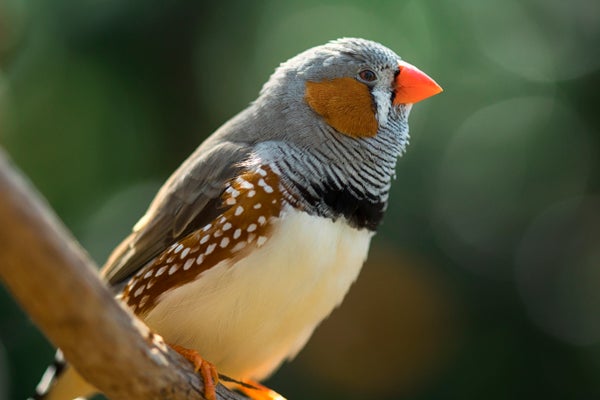[ad_1]
December 12, 2023
4 min read through
Birds may well sing in the early morning mainly because they want a vocal exercise routine

A male zebra finch (Taeniopygia castanotis)
Most expert singers agree that practice can make fantastic. And now investigation released in Nature Communications reveals that songbirds also rely on a day-to-day vocal exercise routine—if they want to impress potential mates. The new analyze is the initially to present that birds’ vocal muscle mass involve workout to achieve peak overall performance, the authors say.
The will need for such a regimen could aid clarify why so numerous birds sing early in the early morning, in accordance to the scientists. “Nobody definitely is familiar with why they do that,” suggests direct review author Iris Adam, a biologist at the University of Southern Denmark. “Our investigation presents an … clarification: possibly they just want to exercise.”
To have an understanding of how a day-to-day exercise routine can impact birds’ vocal muscle groups, Adam and her colleagues prevented singing practice in a group of male zebra finches—a songbird species that, like humans, learns to vocalize by means of social interaction. In some of these animals, the scientists stymied singing by earning an incision that stopped mind signals from achieving the syrinx (a bird’s vocal organ, equivalent to the human larynx). Other zebra finches were bodily unaltered but kept in the dark, where they ended up ready to make noise if they tried using but have been not enthusiastic to sing.
With out exercise, the birds’ vocal skills speedily declined. In finches that ended up rendered unable to use their vocal muscles, these muscle mass were being 5 instances weaker soon after just two times. Just after a few months they had atrophied to search identical to those of juveniles’ vocal organ. In birds that were being stored in the darkish, the syrinx dropped 50 p.c of its energy in just a 7 days.
Soon after a 7 days the scientists introduced the latter finches again into the light, restoring their inspiration to sing. The staff recorded these birds’ music pursuing the deficiency of exercise and in contrast them to recordings of the animals singing just before the dim time period. Most of the finches’ postintervention tracks confirmed a fall in frequency and a more minimal vocal assortment.
The researchers couldn’t listen to a variance amongst the males’ tunes in advance of and after the break—but female zebra finches definitely could. The review team had qualified woman finches to peck keys that would engage in again unique recordings of these birdsongs. When supplied the option to participate in a male bird’s tune ahead of or after the coaching split, 75 p.c of women desired the “before” recording. Adam says this is a shockingly solid desire.
These findings could enable response a extended-standing concern: Why do birds around the earth sing in a day by day dawn chorus? While some birds sing in the early morning to preserve social bonds or protect territory, other individuals (this sort of as birds in captivity) have no very clear purpose to chime in. Experts have hypothesized that dawn is an excellent time to sing because it does not interfere with feeding or since sound transmission is most effective in early early morning air. But these speculations have been hard to demonstrate. The new examine indicates the birds might just need to have to start off their day with exercise routines to maintain their voice in condition.
Male zebra finches do appear to be to be practising when they sing on your own or exterior of evidently relevant social contexts, states Rockefeller College neuroscientist Constantina Theofanopoulou, whose function has focused on vocal learning in songbirds. The male finches have stable tracks that they sing in a rote way to appeal to girls but when singing by yourself, Theofanopoulou claims, they normally improvise new notes or syllables.
These males “are becoming judged by the women on their vocal mastering capabilities,” Theofanopoulou claims. “So whenever they are on your own, they take this prospect to exercise and grow to be far better singers.”
Simply because birdsong includes facts about prior singing exercise, the collective new music of a songbird inhabitants could advise scientists’ comprehending of some birds’ earlier conduct and setting, Adam notes. “When a male is singing, he is also displaying his immediate past,” she states. His track contains details about how significantly time he has experienced to observe, if has had to search for food stuff additional than usual or if predators are around. “All of that will make [male birds] sing a lot less and have an affect on vocal general performance,” Adam states. Birdsong complexity has been studied as an indicator of habitat top quality, and the new findings present how song general performance can provide obvious indications of a bird’s situation.
The research could also assist scientists understand vocal coaching and recovery in individuals. Examining the human larynx is hard without the need of dissection, so the new findings could support display how human vocal muscle groups respond to exercise. For example, the review confirmed that vocal muscle mass can develop into speedier when trained, in contrast to limb muscles, which grow to be stronger and slower.
“If you consider to use limb muscle workout paradigms for head and neck muscle tissue, you would get a absolutely various final result,” Adam claims. “We can do substantially far better if we fully grasp how these muscle groups work.”
[ad_2]
Resource hyperlink






